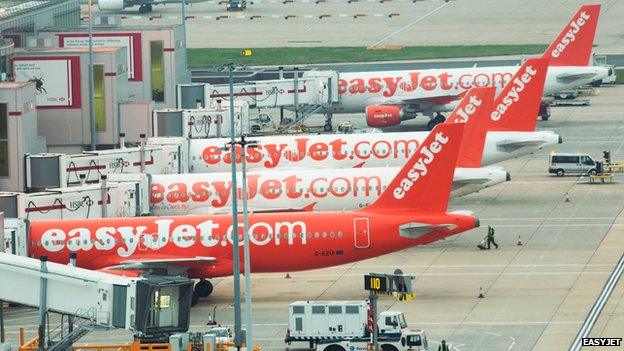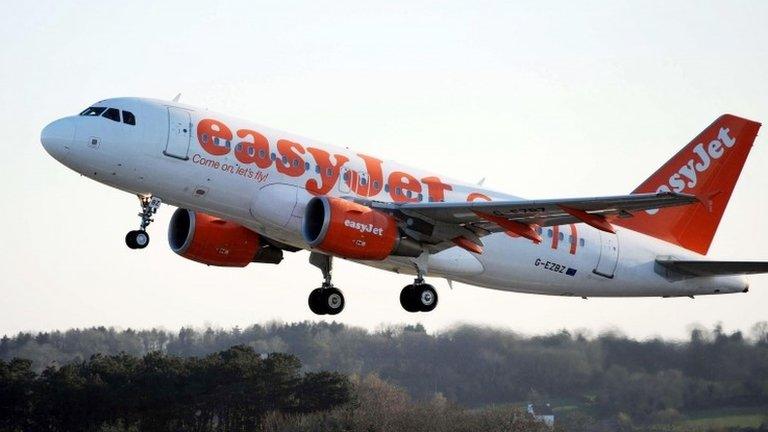Easyjet shares hit after French strike trims profits
- Published

Easyjet shares have fallen by more than 9% after it said the disruption from April's air traffic control strikes in France would cut profits by £25m.
The airline said the disruption, which led it to cancel 600 flights, would knock £25m off its pre-tax profits.
Easyjet also said the crash by the Germanwings plane in March had deterred passengers from booking flights.
The share price fall came despite Easyjet reporting a profit of £7m, external in the six months to 31 March.
That compared with a loss of £53m recorded during the same period last year. Profits were helped by cheaper fuel and a strong finish to the ski season.
'Horrible month'
Easyjet said the second half of the financial year had got off to a bad start.
Chief executive Carolyn McCall said April had been a "one-off horrible month", with the disruption from the French air traffic control strike and following the Germanwings plane crash.
"A lot of passengers just didn't book in April. There is no question [that] when you see any tragic event, you just see a reaction to that from consumers," Ms McCall said.

Carolyn McCall says bookings have picked up after April's problems
Revenue per seat in the third quarter - stripping out the impact of currency movements - is now expected to have fallen by about four percentage points, with the change in the timing of the Easter holiday period also having an impact.
However, Ms McCall added that bookings had "picked up momentum again".
Richard Hunter, head of equities at Hargreaves Lansdown Stockbrokers, said: "Perhaps the fact that the market has become accustomed to being pleasantly surprised has resulted in a sharp markdown to the shares, given that the French air traffic control strikes will impact on revenue per seat in Q3.
"In addition, previously announced currency headwinds are also adding to the short-term gloom, whilst the general airline sector concerns such as geopolitical tensions are ever present in the background."
Competitive environment
Airlines tend to incur losses in the winter and make most of their profits during the summer.
Easyjet's half-year profit was at the upper end of forecasts, since it had previously predicted an outcome somewhere between a £5m loss and a £10m profit, while revenues for the six-month period rose 3.8% to £1.767bn.
Total revenue per seat rose by 0.2% to £54.91, while costs per seat fell 1.4% to £38.66.
"The profit in the half reflects the delivery of our customer-focused revenue initiatives and a strong finish to the ski season, as well as the benefit we received from the lower fuel price and favourable foreign exchange movements," said Ms McCall in the results statement.
"As we enter the important summer season, forward bookings are in line with last year, and as we predicted, passengers are benefiting as fares fall to reflect a more competitive operating environment and lower fuel costs."
She told the BBC's Today programme that low fuel prices had been "enormously helpful" in the first half and that foreign exchange movements had gone in Easyjet's favour. However, she warned that currency movements would "go against us in the second half".
The company saw an exchange rate gain of £18m in the first half, but expects that to be reversed in the second half.
The airline said it was "well positioned to grow revenue and profit this year".
It predicted that the overall market for European short-haul flights would continue to grow, thanks to "improved economic conditions and a lower oil price".
- Published26 March 2015
